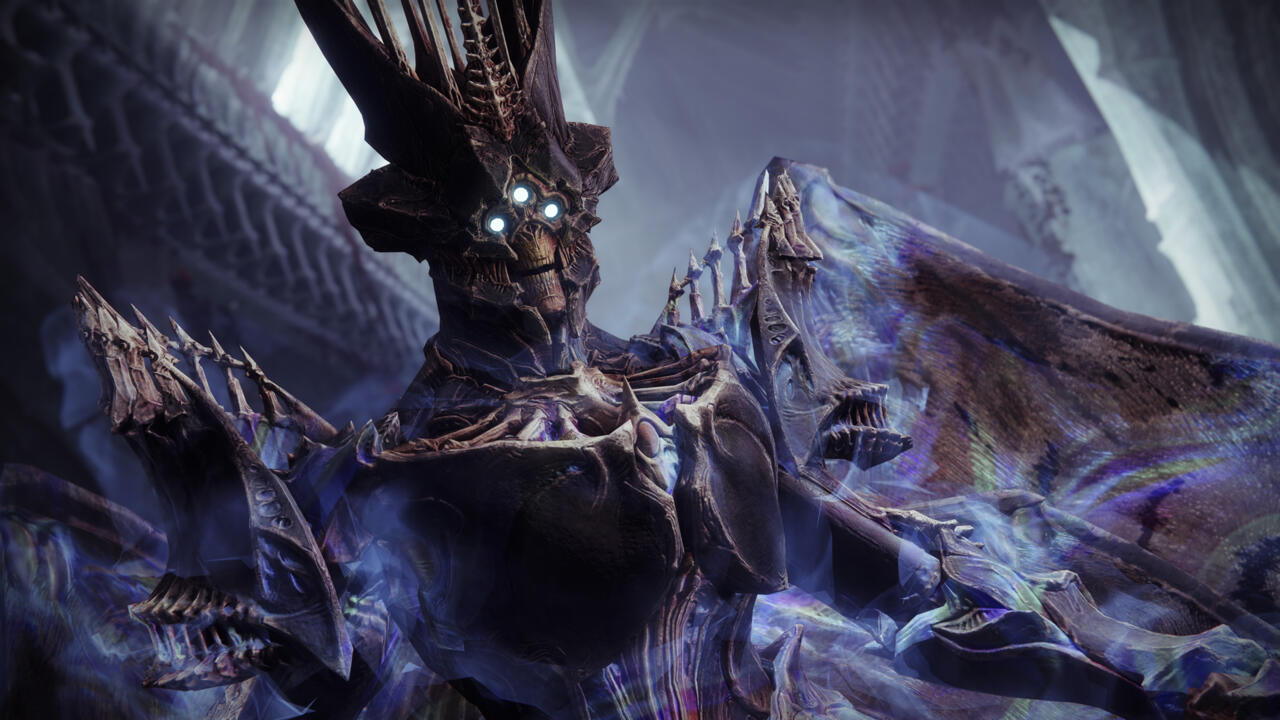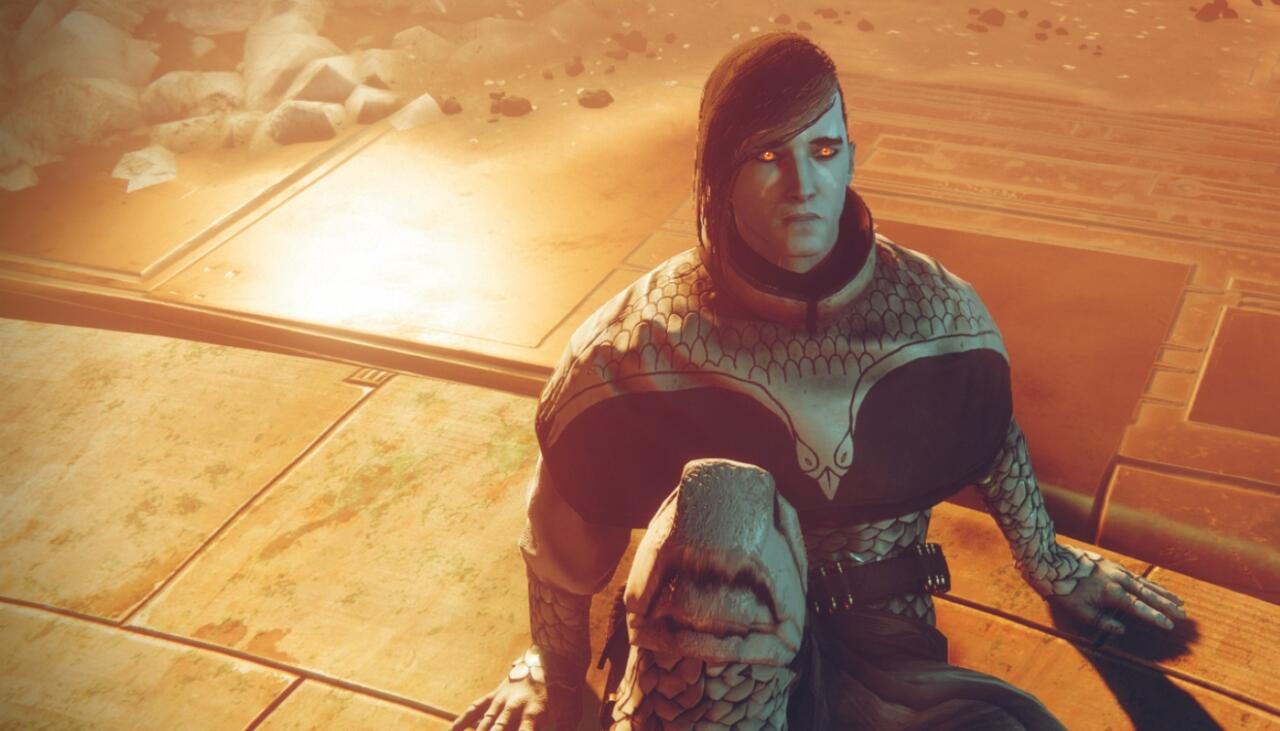Some twists in The Witch Queen’s story campaign and unfolding seasonal episodes are raising big morality questions in Destiny 2.
By
Phil Hornshaw
on
Note: This article goes deep into spoilers for the story campaign of Destiny 2’s The Witch Queen expansion, as well as the Season of the Risen’s story. If you haven’t finished the campaign, you might want to wrap that up before reading further. Check out our Witch Queen campaign story explainer if you have lingering questions.
Things are getting complicated out there in the throne world. The story of Destiny 2’s latest expansion, The Witch Queen, sent players into the realm of the Hive god Savathun to find out how one of the game’s greatest villains managed to gain a power previously reserved only for players. What we learned there shook up a lot of the established rules of the Destiny world–and it’s shifting the paradigm of the game’s story in some profound ways, raising serious questions about the nature of good and evil and where we, the players, fall on that spectrum.
Now Playing: Opinion: The Witch Queen Is Destiny 2’s Best Campaign Yet
There are two big twists in The Witch Queen that really cast doubt on things we thought we knew about how the Destiny universe works. First, the campaign starts with Savathun, a god-like alien who’s been around for eons and has participated in murdering and conquering whole civilizations throughout that time, gaining the Light. That power was previously reserved for humanity; it’s what gives players their superpowers within the game, and many characters treat it with a religious reverence, as they do the Traveler, the giant floating robot from which the Light is derived. Guardians, the wielders of Light, believe the power is inherently good, and that its wielders are chosen by the Traveler for some inherent qualities of good. Light-wielders can be bad people, that’s long established, but the supposition is that the Traveler, by way of the Ghosts, gives the Light to specific people and not others for a reason.
So the supposition is that Savathun, a genocidal monster at the head of a race of genocidal monsters whose ideology worships death, must have stolen the Light through some magical chicanery. We discover about halfway through the campaign, however, that Savathun didn’t steal the Light–she received it the same way we all do. Given past beliefs about the Light and the Traveler, the immediate conclusion is that, despite her past, the Traveler chose Savathun to receive the Light.
That’s a seriously messed up thing in the world of Destiny 2, upending a whole lot of suppositions characters have been making about their powers, their roles in the universe, and the giant mechanical god they worship. If we accept that the Traveler is a benevolent, omnipotent entity, then its choice to give Savathun the Light couldn’t be some kind of mistake. But the Hive are perhaps our single greatest enemy and responsible for the deaths of billions. So are we wrong about the Traveler, or are we wrong about the Hive? And are we wrong about ourselves?

It’s that last question that The Witch Queen low-key asks players, with an element of the story that is somewhat understated but which has been developing over the course of the last four seasons. The story of The Witch Queen takes us through a battle with Savathun that sees us finally battling the Lightbearer Hive god to stop her from doing a ritual that will bind the Traveler within her throne world. The belief is that, if Savathun is successful, she’ll capture the Traveler and the power of the Light for herself and no one else, cutting off humanity from the power it needs to defend itself. So we go to battle against Savathun, eventually defeating and killing her. There are caveats to that situation (namely, that she’s not permanently dead yet), but the reality is that the story ends with us killing Savathun.
Except, did we actually just kill Savathun?
The other big twist of The Witch Queen is that, because Savathun gained control of the Light the same way as all other Guardians, she has a similar experience to all other Guardians. Only people who die can be resurrected as Guardians–Ghosts essentially imbue corpses with the Light and bring them back from the dead. But when this happens, the person being resurrected loses all memory of their past life.
This was a huge theme of the last year with the introduction of Crow, a new character in Destiny 2. Crow is the resurrected, Guardian version of Uldren Sov, a character from Destiny 1 and the story campaign of the Destiny 2 expansion Forsaken. Uldren was a villain in Forsaken; he fell victim to some intricate manipulations (that ultimately were the work of Savathun, in fact), and murdered Cayde-6, a character close to players who’d been part of the game for years. Forsaken is about players hunting down Cayde’s killer and exacting revenge on him: We were the ones who served Uldren his death warrant.
Crow is not Uldren, however, and this is a key distinction. Though Crow and Uldren share a body, Crow didn’t remember being Uldren (at least, not until Savathun started messing with him, but that’s extraneous to the point here), and the same is true of other Guardians with their past lives. They’re effectively different people after resurrection than before they died, as Crow demonstrated through the last year of seasonal content. He’s not the Uldren we faced down and murdered, he’s someone new.

Bungie spent more than a year establishing Crow as an independent entity from Uldren, and it has been a huge arc for the story. And something the story has suggested but not yet explored is that the same thing is true of Savathun. Resurrected as a Guardian, the Hive god isn’t a Hive god anymore. She was someone new, and in fact, the story campaign of The Witch Queen hinges on the fact that Savathun can’t remember her past life. And while a big part of the story is about how Savathun set up a series of manipulations for us and her resurrected self to execute a plan, we’re still not clear on who, exactly, the person we fought and killed actually was. And, really, if everyone resurrected in the Light deserves a second chance–in fact, it’s standing Vanguard dogma that Guardians should not try to learn about their past identities, and no one is to hold a past life against those who are resurrected–aren’t we guilty of straight-up murder, in some respect?
The Witch Queen quickly introduces a ton of nuance to Destiny 2 that raises a whole lot of red flags about our part in the world and the war we’re currently fighting. We know from background lore and elements of the story that the Ghosts who help the Hive are the same little robots who follow us around, healing our wounds and reviving our dead bodies when we fall off a cliff or get punched in the face by a huge alien robot. We’re currently engaged in destroying those Ghosts, along with their Hive Guardian companions, and treating them as traitors. But for the most part, we’ve invaded their neighborhood in the throne world. The lore also suggests these Ghosts are serving the Hive not because of coercion or persuasion, but because of a moral judgment. They think the Hive deserve their compassion, and that’s why many have joined Savathun’s Lucent Brood. These Ghosts chose their side, sure, if you look at this as purely war. But we never tried talking with any of these Hive folks, did we?
Then there’s Fynch, a Hive Ghost defector who helps us in the throne world, who questions Ghost’s assertion that all Hive Ghosts deserve death. Fynch switched sides to help us, so does he also fall into that category? We’re made to ponder where the line should be drawn in terms of forgiveness and reconciliation.
The Season of the Risen makes it clearer that the Lucent Hive are not (all) potentially blameless. In the seasonal missions, we see Hive Guardians making their way to Earth, where they ambush human Guardians and steal their Light as part of a grander scheme we don’t yet understand. Granted, you could make the argument that this is exactly what we’re doing to them in the throne world, but at least we’re fighting in defense of our territory and people.

It seemed more straightforward, at least, until we got the seasonal story rolling. Here, we see the Vanguard essentially going forward with torture. The new PsiOps Battlegrounds activity dispatches players to capture Hive Guardians, who are then shoved into big glass tubes, where their minds can be invaded by our new allies in the Cabal. As is explained in the new Psisorium location in the H.E.L.M., each of the Hive combatants captured is held in a sort of limbo, where they feel no pain, but in which they are neither living nor dead. Crow is already voicing a lot of concerns about this whole practice because it sounds an awful lot like torture. At the very least, we seem to be lobotomizing these Hive.
And yeah, the Hive as a race are a genocidal, conquering death cult who have killed countless people, including humans. But again, we have to consider that the Traveler gave them the Light. If we consider the Light to be a moral judgment about us, an affirmation of our righteousness, then isn’t the same thing true about the Hive? Beyond just the ins and outs of the Destiny 2 universe, is it okay to torture another life form, psychically or otherwise? Are we selling our souls for victory over the Hive?
Destiny 2 has had us thinking about questions like this, and the actions we take part in, since the Forsaken campaign at least. With The Witch Queen, however, things are getting turned way up. This is no longer a story of light versus dark, and even just a couple weeks into the new expansion and its seasonal stories, it seems a big theme of this year might be reconciling with our own capacity to do evil–and to justify it.
Got a news tip or want to contact us directly? Email [email protected]

